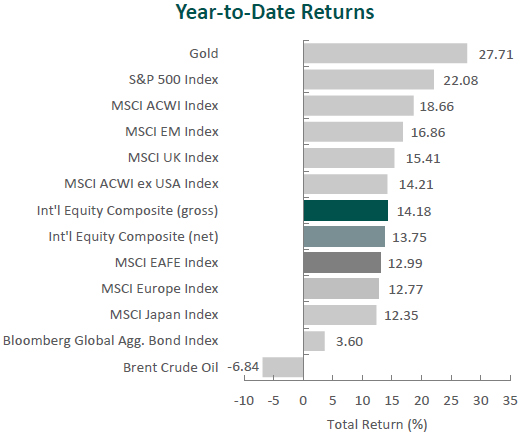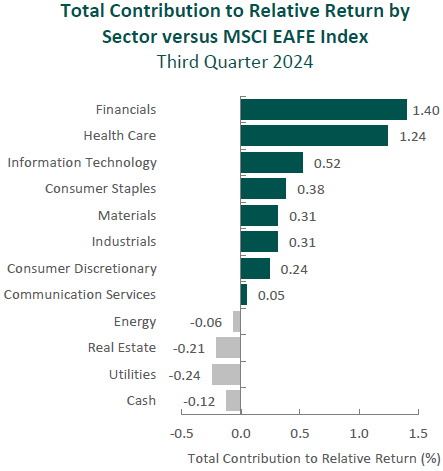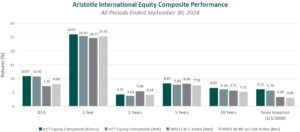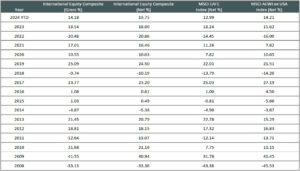Commentary
International Equity 3Q 2024
(All MSCI index returns are shown net and in U.S. dollars unless otherwise noted.)
Markets Review

Sources: CAPS CompositeHubTM, Bloomberg
Past performance is not indicative of future results. Aristotle International Equity Composite returns are presented gross and net of investment advisory fees and include the reinvestment of all income. Gross returns will be reduced by fees and other expenses that may be incurred in the management of the account. Net returns are presented net of actual investment advisory fees and after the deduction of all trading expenses. Aristotle Capital Composite returns are preliminary pending final account reconciliation. Please see important disclosures at the end of this document.
Global equity markets reached record highs during the quarter. The MSCI ACWI Index rose 6.61%, while the Bloomberg Global Aggregate Bond Index rallied 6.98%. Value outperformed growth, with the MSCI ACWI Value Index outperforming the MSCI ACWI Growth Index by 5.35% during the quarter.
The MSCI EAFE Index climbed 7.26% during the third quarter, while the MSCI ACWI ex USA Index went up 8.06%. Within the MSCI EAFE Index, Asia/Pacific ex-Japan gained the most, while Japan gained the least. On a sector basis, nine of the eleven sectors within the MSCI EAFE Index posted positive returns, with Real Estate, Utilities and Communication Services recording the largest gains. Conversely, Energy, Information Technology and Health Care performed the worst.
The global economy continued to improve, with the IMF projecting global GDP to rise to 3.3% in 2025 as economic indicators trended positively. Both the U.K. and eurozone reported annualized inflation at 2.2% in August, while U.S. inflation fell below the 3.0% mark for the first time in over three years. To maintain economic growth and employment, the Bank of England cut its bank rate 25 basis points, the European Central Bank reduced its deposit facility rate 25 basis points and the U.S. Federal Reserve slashed its federal funds rate 50 basis points.
In Asia, the Bank of Japan announced its second rate hike of the year to a short-term policy rate of 0.25%, marking its highest level since 2008. With rising inflation, a weak yen and a push for policy normalization, Bank of Japan Governor Kazuo Ueda has not ruled out an additional rate hike by the end of the year. Meanwhile, China is grappling with deflationary pressures, as consumer prices rose just 0.6% year-over-year in August. In response, the People’s Bank of China unveiled a monetary stimulus package worth 1 trillion to 2 trillion yuan, which included reducing a key short-term interest rate and lowering banks’ reserve requirements.
On the geopolitical front, the ongoing wars in Ukraine-Russia and the Middle East continued with escalations of various magnitudes. At the time of this writing, oil markets responded with Brent Crude rising over 12% in the first five trading days of October to more than $80 per barrel.
Performance and Attribution Summary
For the third quarter of 2024, Aristotle Capital’s International Equity Composite posted a total return of 10.97% gross of fees (10.82% net of fees), outperforming the MSCI EAFE Index, which returned 7.26%, and the MSCI ACWI ex USA Index, which returned 8.06%. Please refer to the table below for detailed performance.
| Performance (%) | 3Q24 | YTD | 1 Year | 3 Years | 5 Years | 10 Years | Since Inception* |
|---|---|---|---|---|---|---|---|
| International Equity Composite (gross) | 10.97 | 14.18 | 26.07 | 4.31 | 8.35 | 6.67 | 6.21 |
| International Equity Composite (net) | 10.82 | 13.75 | 25.47 | 3.81 | 7.84 | 6.16 | 5.70 |
| MSCI EAFE Index (net) | 7.26 | 12.99 | 24.77 | 5.48 | 8.20 | 5.71 | 3.39 |
| MSCI ACWI ex USA Index (net) | 8.06 | 14.21 | 25.35 | 4.14 | 7.59 | 5.22 | 3.06 |

Source: FactSet
Past performance is not indicative of future results. Attribution results are based on sector returns which are gross of investment advisory fees. Attribution is based on performance that is gross of investment advisory fees and includes the reinvestment of income.
From a sector perspective, the portfolio’s outperformance relative to the MSCI EAFE Index can be attributed to security selection, while allocation effects had a negative impact. Security selection in Financials, Health Care and Information Technology contributed the most to the portfolio’s relative performance. Conversely, an overweight in Energy and a lack of exposure to Utilities and Real Estate detracted from relative returns.
Regionally, security selection was responsible for the portfolio’s outperformance, while allocation effects had a negative impact. Security selection in Europe & Middle East and Asia contributed the most to relative performance, while exposure to Emerging Markets and an underweight in Asia detracted.
Contributors and Detractors for 3Q 2024
| Relative Contributors | Relative Detractors |
|---|---|
| Brookfield | Samsung Electronics |
| Haleon | Rentokil Initial |
| MonotaRO | Cameco |
| Otsuka Holdings | Heineken |
| Accenture | TotalEnergies |
Brookfield, one of the world’s largest and most diversified private market investors, was the top contributor for the period. Several key factors contributed to this success, which are linked to both catalysts currently underway and the company’s long-term strategic positioning. In the near term, the company reported significant fundraising strength, with over $68 billion in inflows during the second quarter of 2024. This capital influx was bolstered by an expanded credit platform, positioning Brookfield to return substantial cash to shareholders through more than $800 million in share buybacks so far this year. Additionally, Brookfield advanced its energy transition strategy, particularly through its renewable power and infrastructure businesses. A notable development was the company’s agreement to acquire a majority stake in Neoen, a leading global renewables platform operating in Australia, France and the Nordics. Neoen specializes in solar, wind and energy storage projects, sectors that are critical to the global shift toward clean energy. Looking at Brookfield from a long-term perspective, the company is uniquely positioned to capitalize on its scale, expertise and diverse business model. Its ability to attract large amounts of capital, combined with its experience in managing high-quality assets, gives Brookfield a competitive edge in both the traditional and renewable energy markets. Brookfield’s long-standing reputation as a successful owner-operator and its ability to quickly act on opportunities further strengthen our outlook for the company.
Rentokil Initial, the U.K.-based pest control and hygiene services company, was one of the largest detractors for the quarter. In an unscheduled update, management provided a revised outlook for the North American pest control business, with 2024 revenue growth from the region now expected to be just 1%, a significant reduction from the prior guidance of 2%-4%. The company is experiencing temporary disruption due to the ongoing integration of Terminix into Rentokil’s existing branch network, with recent investments in sales and marketing requiring additional time to deliver results. However, while these integration efforts are weighing on short-term results, we believe they are precisely the foundation of Rentokil’s long-term value proposition. Once integration challenges are resolved, the combination should provide operational synergies through scale efficiencies and improved density in key markets, paving the way for a faster consolidation of the U.S. pest control industry and positioning the company to capture even more market share in the coming years. This “Right Way 2” operational plan underscores management’s focus on increasing customer retention and driving productivity gains via technology and data utilization. The ongoing branch integration and market densification initiatives represent key catalysts already in motion. Given its scale, operational excellence and strategic acquisitions, we believe Rentokil is well positioned to deliver both revenue growth and margin expansion over time.
Recent Portfolio Activity
| Buys | Sells |
|---|---|
| Diageo | KDDI |
| MonotaRO |
During the quarter, we sold our position in KDDI and invested in two new positions: Diageo and MonotaRO.
We first invested in KDDI during the third quarter of 2013. When we originally invested, smartphone penetration in Japan was only about 40%, which is low for a developed economy. In contrast, the U.S. was at approximately 70% at the time. Our estimate of normalized penetration in Japan was closer to 70%, and today it is over 85%. (The U.S. is over 90%.) We view the Japanese telecom industry as unique because the spectrum is “owned by the people.” As a result, telecommunications providers like KDDI are not required to participate in expensive spectrum auctions as are their U.S. peers. This results in lower capital intensity and higher normalized FREE cash flow for the Japanese companies. Additionally, KDDI has benefited from a competitive environment best described as a rational oligopoly. Over the years, government-controlled NTT has been ceding market share to KDDI and Softbank. Softbank has seemingly been continuously distracted and required to divert FREE cash flow to fund its venture investments. These circumstances created a favorable decade for KDDI, as the company executed well, increasing average revenue per user (“ARPU”) and ancillary services. However, KDDI now has ambitions to enter “new areas,” as its core wireless business has become saturated and increasingly competitive with the entrance of a fourth player, Rakuten. While many of our catalysts played out as expected, we view the company’s recent multibillion-dollar acquisition (in conjunction with Mitsubishi Corp.) of Japanese retailer Lawson as a suboptimal allocation of capital. Lawson operates approximately 14,600 stores in Japan, which KDDI intends to utilize to promote banking and insurance products. Although we continue to believe KDDI shares are inexpensive, we exited the investment, as we see few catalysts remaining and have questions on strategy that we prefer to monitor from the sidelines.
Diageo plc
Headquartered in London, England, Diageo is a global leader in the alcoholic beverages industry. The company has a vast portfolio of over 200 well-recognized premium spirits (~80% of FY 2024 sales), beers (~15% and mostly Guinness) and other beverages (~5%) that are sold in nearly 180 countries. Led by its Johnnie Walker brand, Diageo is the world’s largest exporter of Scotch whiskey—its largest category at ~25% of sales—followed by other spirits such as tequila and vodka (~10% each). Diageo also owns a ~34% stake in the premium champagne and cognac maker Moët Hennessy (a subsidiary of LVMH Moët Hennessy Louis Vuitton).
The company is the product of the 1997 merger between Grand Metropolitan and Guinness and the subsequent divestiture of its food-related businesses. M&A continues to be a part of Diageo’s strategy, as regional brands often dominate local markets (which provides further opportunities for mergers and industry consolidation). Over the last decade, Diageo has also meaningfully increased its presence in the rapidly growing tequila market with the acquisitions of Don Julio and Casamigos.
High-Quality Business
Some of the quality characteristics we have identified for Diageo include:
- Strong portfolio of some of the world’s most iconic alcohol brands (e.g., Johnnie Walker, Crown Royal, Guinness, Smirnoff, Captain Morgan, Baileys and Tanqueray, among others), which supports pricing power and promotes customer loyalty;
- Global reach and distribution networks provide Diageo with operational flexibility and economies of scale; and
- Well diversified across product categories and geographies, with a history of fairly consistent results even in difficult economic environments.
Attractive Valuation
Given our estimates of higher future earnings through market share gains in alcoholic beverages, we believe shares of the company are undervalued. At our purchase price, we believe shares were valued at a price to normalized earnings of ~13x, an attractive price for this high-quality business, and a discount to our estimate of intrinsic value.
Compelling Catalysts
Catalysts we have identified for Diageo, which we believe will cause its stock price to appreciate over our three- to five-year investment horizon, include:
- Well positioned to benefit from the global consumer mix shift toward premium alcoholic beverages;
- Continued market share gains in Scotch whiskey and tequila given the company’s scale advantage;
- Further penetration in emerging markets (e.g., India, China, Brazil, Mexico and African countries); and
- Enhanced FREE cash flow should result in dividend increases and benefits of further consolidation through selective acquisitions.
MonotaRO Co., Ltd. plc
Established in Japan in 2000, MonotaRO operates a business-to-business (B2B) e-commerce platform, selling approximately 20 million items (over 650,000 SKUs) to more than 8 million customers (mostly in Japan). The company is an MRO (maintenance, repair and operations) distributor focused on small- and mid-sized companies (~two-thirds of customers), with manufacturing, construction and auto repair industries accounting for the majority of sales. MonotaRO’s business may seem simple; however, the company’s unique profile (>95% of sales are online) and innovative solutions, we believe, provide its customers a distinct value proposition and its shareholders a compelling opportunity to own a leader in a fragmented industry.
MonotaRO serves as a one-stop solution, allowing customers to shop for millions of products via a centralized location. Its transparent pricing saves clients time and reduces costs by removing the need to rely on independent catalogs, individual quotes or separate orders. The company sources its merchandise from thousands of suppliers (i.e., manufacturers and wholesalers) in ten countries and carries over 500,000 products in stock, ready for same-day shipment from its own distribution centers. In addition, its ONE SOURCE Lite service allows large clients to link their purchasing management systems to MonotaRO’s, providing company-wide visibility of items and purchases and an integrated experience.
MonotaRO operates as a consolidated subsidiary of U.S.-based Grainger (an industrials supplier) and provides consulting services to the parent’s e-commerce businesses in the U.S., Germany and the U.K.
High-Quality Business
Some of the quality characteristics we have identified for MonotaRO include:
- High barriers to entry given that scale is essential to most products in the MRO market, which requires high variety yet small lot ordering, making it imperative to offer a high number of SKUs while investing in technology to provide easier curation and shorter delivery times;
- The company’s vast product breadth, combined with its advanced data analytics, allows it to analyze procurement behaviors and better predict which items to keep in inventory. The client is able to spend less time ordering and can count on reliable delivery;
- Attractive business fundamentals, as ordering can be cumbersome, and clients value reliability, convenience and variety more so than price. The MRO market is also highly fragmented and inefficient. As MonotaRO expands, the more difficult it becomes for others to compete; and
- Expertise in database marketing leads to high repeat order rates, while its integrated purchasing management system (primarily for large corporate customers) increases retention.
Attractive Valuation
Using our estimates of normalized sales attained through continued market share gains, we believe MonotaRO’s current stock price is offered at a discount to our estimate of the company’s intrinsic value.
Compelling Catalysts
Catalysts we have identified for MonotaRO, which we believe will cause its stock price to appreciate over our three- to five-year investment horizon, include:
- Ability to continue gaining share from inefficient small players (e.g., door-to-door dealers relying on people, catalogs and even fax machines);
- Increasing existing customers’ sales through technological improvements (e.g., website personalization and recommendation displays) aimed at reducing the time it takes to (1) find, (2) purchase and (3) receive products;
- Further penetration into enterprise customers should provide a larger source for sales growth, as this segment represents a higher customer lifetime value as well as stickiness; and
- Growth in sales of MonotaRO’s private label offering of approximately 300,000 products that are higher margin yet provide savings to clients.
Conclusion
With the evolving global macroeconomic landscape, increasing geopolitical tensions and the approaching U.S. elections, there are plenty of headlines to follow. At Aristotle Capital, our priority is determining whether these events provide valuable insights for long-term investors. Instead of repositioning our portfolios based on predictions of how the market may or may not respond to such events, we focus on identifying and owning companies that, we believe, can succeed in the face of global uncertainty. It is our belief and experience that well-managed, high-quality companies will take appropriate actions to respond to the ever-changing world.
The opinions expressed herein are those of Aristotle Capital Management, LLC (Aristotle Capital) and are subject to change without notice. Past performance is not a guarantee or indicator of future results. This material is not financial advice or an offer to buy or sell any product. You should not assume that any of the securities transactions, sectors or holdings discussed in this report were or will be profitable, or that recommendations Aristotle Capital makes in the future will be profitable or equal the performance of the securities listed in this report. The portfolio characteristics shown relate to the Aristotle International Equity strategy. Not every client’s account will have these characteristics. Aristotle Capital reserves the right to modify its current investment strategies and techniques based on changing market dynamics or client needs. There is no assurance that any securities discussed herein will remain in an account’s portfolio at the time you receive this report or that securities sold have not been repurchased. The securities discussed may not represent an account’s entire portfolio and, in the aggregate, may represent only a small percentage of an account’s portfolio holdings. The performance attribution presented is of a representative account from Aristotle Capital’s International Equity Composite. The representative account is a discretionary client account which was chosen to most closely reflect the investment style of the strategy. The criteria used for representative account selection is based on the account’s period of time under management and its similarity of holdings in relation to the strategy. Recommendations made in the last 12 months are available upon request.
Returns are presented gross and net of investment advisory fees and include the reinvestment of all income. Gross returns will be reduced by fees and other expenses that may be incurred in the management of the account. Net returns are presented net of actual investment advisory fees and after the deduction of all trading expenses.
All investments carry a certain degree of risk, including the possible loss of principal. Investments are also subject to political, market, currency and regulatory risks or economic developments. International investments involve special risks that may in particular cause a loss in principal, including currency fluctuation, lower liquidity, different accounting methods and economic and political systems, and higher transaction costs. These risks typically are greater in emerging markets. Securities of small‐ and medium‐sized companies tend to have a shorter history of operations, be more volatile and less liquid. Value stocks can perform differently from the market as a whole and other types of stocks.
The material is provided for informational and/or educational purposes only and is not intended to be and should not be construed as investment, legal or tax advice and/or a legal opinion. Investors should consult their financial and tax adviser before making investments. The opinions referenced are as of the date of publication, may be modified due to changes in the market or economic conditions, and may not necessarily come to pass. Information and data presented has been developed internally and/or obtained from sources believed to be reliable. Aristotle Capital does not guarantee the accuracy, adequacy or completeness of such information.
Aristotle Capital Management, LLC is an independent registered investment adviser under the Advisers Act of 1940, as amended. Registration does not imply a certain level of skill or training. More information about Aristotle Capital, including our investment strategies, fees and objectives, can be found in our Form ADV Part 2, which is available upon request. ACM-2410-41

Sources: CAPS CompositeHubTM, MSCI

Composite returns for all periods ended September 30, 2024 are preliminary pending final account reconciliation.
Past performance is not indicative of future results. The information provided should not be considered financial advice or a recommendation to purchase or sell any particular security or product. Performance results for periods greater than one year have been annualized.
Returns are presented gross and net of investment advisory fees and include the reinvestment of all income. Gross returns will be reduced by fees and other expenses that may be incurred in the management of the account. Net returns are presented net of actual investment advisory fees and after the deduction of all trading expenses.
The MSCI EAFE Index (Europe, Australasia, Far East) is a free float-adjusted market capitalization-weighted index that is designed to measure the equity market performance of developed markets, excluding the United States and Canada. The MSCI EAFE Index consists of the following 21 developed market country indexes: Australia, Austria, Belgium, Denmark, Finland, France, Germany, Hong Kong, Ireland, Israel, Italy, Japan, the Netherlands, New Zealand, Norway, Portugal, Singapore, Spain, Sweden, Switzerland and the United Kingdom. The MSCI ACWI captures large and mid-cap representation across 23 developed market countries and 24 emerging markets countries. With approximately 2,700 constituents, the Index covers approximately 85% of the global investable equity opportunity set. The MSCI ACWI Growth Index captures large and mid-cap securities exhibiting overall growth style characteristics across 23 developed markets countries and 24 emerging markets countries. The MSCI ACWI Value Index captures large and mid-cap securities exhibiting overall value style characteristics across 23 developed markets countries and 24 emerging markets countries. The MSCI ACWI ex USA Index captures large and mid-cap representation across 22 of 23 developed markets countries (excluding the United States) and 24 emerging markets countries. With approximately 2,100 constituents, the Index covers approximately 85% of the global equity opportunity set outside the United States. The MSCI Emerging Markets Index is a free float-adjusted market capitalization-weighted index that is designed to measure the equity market performance of emerging markets. The MSCI Emerging Markets Index consists of the following 24 emerging market country indexes: Brazil, Chile, China, Colombia, Czech Republic, Egypt, Greece, Hungary, India, Indonesia, Korea, Kuwait, Malaysia, Mexico, Peru, Philippines, Poland, Qatar, Saudi Arabia, South Africa, Taiwan, Thailand, Turkey and United Arab Emirates. The S&P 500® Index is the Standard & Poor’s Composite Index of 500 stocks and is a widely recognized, unmanaged index of common stock prices. The Brent Crude Oil Index is a major trading classification of sweet light crude oil that serves as a major benchmark price for purchases of oil worldwide. The MSCI Japan Index is designed to measure the performance of the large and mid-cap segments of the Japanese market. With approximately 200 constituents, the Index covers approximately 85% of the free float-adjusted market capitalization in Japan. The Bloomberg Global Aggregate Bond Index is a flagship measure of global investment grade debt from 28 local currency markets. This multi-currency benchmark includes treasury, government-related, corporate and securitized fixed-rate bonds from both developed and emerging markets issuers. The MSCI United Kingdom Index is designed to measure the performance of the large and mid-cap segments of the U.K. market. With nearly 100 constituents, the Index covers approximately 85% of the free float-adjusted market capitalization in the United Kingdom. The MSCI Europe Index captures large and mid-cap representation across 15 developed markets countries in Europe. With approximately 400 constituents, the Index covers approximately 85% of the free float-adjusted market capitalization across the European developed markets equity universe. These indexes have been selected as the benchmarks and are used for comparison purposes only. The volatility (beta) of the Composite may be greater or less than the respective benchmarks. It is not possible to invest directly in these indexes.



